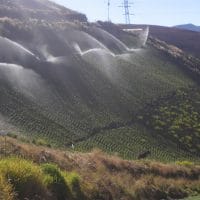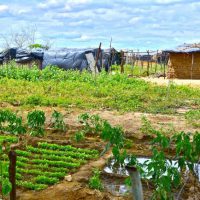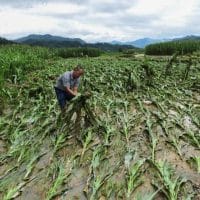-
Jeff Bezos donates three minutes’ income to help Australia fight wildfires
The donation would be equivalent to someone who earned $500 per week announcing on social media that they had just donated five cents to help tackle the blazes.
-
Climate scientist: I witnessed Australia on fire. Climate change is already here.
Prior to beginning my sabbatical stay in Sydney, I took the opportunity this holiday season to vacation in Australia with my family. We went to see the Great Barrier Reef—one of the great wonders of this planet—while we still can. Subject to the twin assaults of warming-caused bleaching and ocean acidification, it will be gone in a matter of decades in the absence of a dramatic reduction in global carbon emissions.
-
Love the land or watch it die
Sagebrush, Ponderosa Pine, Juniper Trees, and Piñón Pine are important flora in the western United States. Juniper can live more than 1,000 years, as can some Piñón. Ponderosa live up to 400 years. Sagebrush is a perennial and can survive for 100 years. All have been and are used for a variety of purposes by native peoples.
-
Are numbers of species a true measure of ecosystem health?
A recent study that found no general decline in the numbers of species in individual ecosystems has sparked controversy. Some scientists see it as evidence of how species adapt, while others see it as a sign that common invasive species, such as rats and mosquitoes, are the real winners.
-
Dossier 21: The neoliberal attack on rural India
If human agency, driven by a model of economics and development gone berserk, is a major driving factor in the changes upon us, there is plenty to be learned from this region and many like it.
-
Capitalism ‘solves’ the Nitrogen Crisis: A brief history
Part Three of Ian Angus’s examination of the disruption of the global nitrogen cycle by an economic system that values profits more than life itself.
-
Imagining the Green New Deal with Robert Hockett
In this episode, we speak with Robert Hockett, Edward Cornell Professor of Law at Cornell Law School. At Cornell, about his role in crafting the Green New Deal Resolution, his conception of finance as a franchise, and his experience as an advisor to Congresswoman Alexandria Ocasio-Cortez as well to Senators Sanders and Warren.
-
The struggle for a just society is long, requiring action on many fronts
‘The struggle for a socially just and ecologically sound society requires activity on many fronts. This includes the crucial work of organizing and activist engagement, as well as education about the economic, political, and ecological complexities that exist and why so many of the problems facing humanity are either caused or made worse by capitalism.’
-
The New Postcolonial Economics with Fadhel Kaboub
In this episode, we speak with Fadhel Kaboub (@fadhelkaboub), associate professor of economics at Denison University and President of the Global Institute for Sustainable Prosperity. Fadhel outlines a new critical approach to postcolonial political economy, arguing that re-gaining financial sovereignty is a crucial next step for postcolonial nations hoping to achieve social, economic, and environmental justice.
-
White farms and black farms: will South African land finally shed apartheid’s proportions?
Many here say that South Africa’s constitution has never been an impediment to land redistribution; the problem was always the political will of the ANC, which abandoned Marxist ideology for a neoliberal approach.
-
Under the cover of philanthropy: a monopoly machine at work
The long-term costs of allowing a handful of corporations to take over healthcare and agriculture in developing countries, in exchange for vaccinations and hybrid seeds sold at discounted price, will be paid by populations in the Global South once the process of monopolization is complete.
-
Roxanne Dunbar-Ortiz, Loaded & Gregg Levine on Fukushima Daichi radiation
Roxanne Dunbar-Ortiz tells us about her new book, Loaded: A Disarming History of the Second Amendment.
Then we talk with journalist Gregg Levine about his special investigation for The Nation Magazine into the deaths and illnesses afflicting U.S. sailors exposed to radiation from the Fukushima Daichi meltdown. It’s titled “Seven Years on, Sailors Exposed to Fukushima Radiation Seek Their Day in Court.”
-
Animal liberation, human liberation
The Left must endeavor to make visible the political valence of meat, let alone other industrial uses of animals. This act of acute empathy reveals the extent of one’s political imagination.
-
Land (in) justice in Brazil
The implementation of austerity measures in the Brazilian countryside, then, casts a long shadow on the potential of farming and land reform to provide the next generation with a sustainable future. It threatens decades of progress made by land justice warriors.
-
Maize, rice, wheat: alarm at rising climate risk to vital crops
No one likes to think about how extreme weather events could devastate food production which could cause global panic and disaster. However, scientists, led by Chris Kent, of the Met Office, focused their initial efforts on how extreme weather would affect maize, one of the world’s most widely grown crops. Along with maize other staple crops could be affected including those of rice, wheat and soya beans.
-
The Election of Donald Trump
1. The recent election of Donald Trump after Brexit, the rise of fascist votes in Europe, but also and much better, the electoral victory of SYRIZA and the rise of Podemos are all manifestations of the depth of the crisis of the system of globalized neoliberalism. This system, which I have always considered unsustainable, is imploding before our eyes at its very heart. All attempts to save the system — to avoid the worst — by minor adjustments are doomed to failure.
-
Fidel Castro — Beyond Words
We lost Fidel. We gained a history of examples and wisdom. The story of Fidel is beyond words — we cannot describe it with words alone. So I would like to just give a testimony. He used all his wisdom, knowledge, leadership, and dedication to build, over 60 years, a united and organized people, who […]
-
Brexit and the EU Implosion: National Sovereignty — For What Purpose?
The defense of national sovereignty, like its critique, leads to serious misunderstandings once one detaches it from the social class content of the strategy in which it is embedded. The leading social bloc in capitalist societies always conceives sovereignty as a necessary instrument for the promotion of its own interests based on both capitalist exploitation […]
-
Are Sanders and Fair Trade a Threat to the Global Poor?
On April 24, 2013, some 1,134 people died in the collapse of the Rana Plaza complex outside Dhaka, the capital of Bangladesh. The building housed factories where low-wage workers, largely women, stitched garments for the U.S. and European markets. For several years before the disaster a number of U.S. opinion makers — notably New York […]
-
Germany: Icy Times and Rays of Hope
2016 began here with an icy chill, not only with the weather but far worse, with human relations. It also offered some, like myself, at least a few warm rays of hope. First the larger scene. The huge influx of immigrants and asylum seekers, over a million in 2015, saw Germany effectively split in […]
















